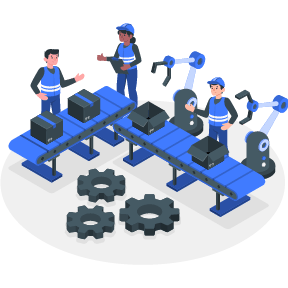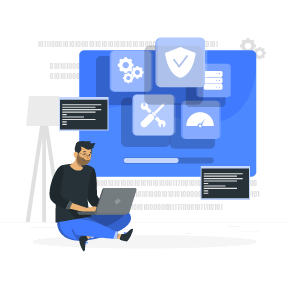Business Intelligence Reporting (BI Reporting)
Unlocking the Power of Data
What Is BI Reporting?
(BI Full Form Business Intelligence Reporting)
This functionality is built-in to the Odoo ERP system and we Synconics has developed an advanced Odoo BI Dashboard reporting tool. On-Screen reports can quickly be graphed in a number of ways.
Business Intelligence (BI) reporting refers to the process of collecting, analyzing, and presenting data in a visual and easily digestible format to help organizations make informed decisions. BI reporting tools and solutions are designed to turn raw data into meaningful insights, trends, and performance metrics, which can be used to identify opportunities, address challenges, and optimize business processes.
Business Intelligence Reporting (BI Reporting) collects, analyzes, and presents data in user-friendly reports and dashboards. It enables decision-makers to obtain insights, track performance, and make data-driven decisions by utilizing tools that depict complex data to improve business outcomes.
Key aspects and Benefits of BI reporting
Odoo ERP modules development involves modification and extension of existing modules to fit your needs or creating brand new modules from scratch. Our Odoo ERP experts do both.
Data Collection and Integration
Data Analysis
Data Visualization
Interactive Dashboards
Ad Hoc Reporting
Key Performance Indicators (KPIs)
Business Insights and Decision-Making
Identifying Opportunities and Challenges
Performance Monitoring
Predictive and Prescriptive Analytics
Benefits Of Business Reporting as per User Role
An ERP (Enterprise Resource Planning) dashboard provides various benefits to different user roles within an organization. Here are some of the key advantages for specific user roles:
Management and Executives
- Real-time Insights: Access to real-time data, allowing them to make informed decisions quickly.
- KPI Monitoring: Track key performance indicators (KPIs) across different departments and business processes.
- Data Visualization: Understand complex data through charts, graphs, and visual representations.
- Overall Performance Analysis: Get a holistic view of the organization's performance and identify areas for improvement.


Finance Team
- Financial Reporting: Generate financial reports, balance sheets, income statements, and cash flow statements efficiently.
- Budget Management: Monitor budgets and expenses in real-time, ensuring financial discipline.
- Invoice and Payment Tracking: Track invoices, outstanding payments, and cash flow status.
Sales Team
- Sales Analytics: Access sales data, customer information, and sales trends to optimize strategies.
- Lead Management: Track leads through the sales funnel and analyze conversion rates.
- Order Status: Check the status of orders, shipments, and inventory availability.

Human Resources
- Employee Information: Access employee data, including attendance, leave, and performance records.
- Recruitment and Onboarding: Manage recruitment processes and track new hires' onboarding progress.
- Training and Development: Monitor training activities and employee skill development.
Supply Chain and Inventory Team
- Inventory Control: Monitor stock levels, reorder points, and inventory movement to prevent stockouts.
- Supply Chain Visibility: Track goods in transit and monitor supplier performance.
- Warehouse Management: Optimize warehouse operations and order fulfillment.


Production Team
- Production Monitoring: Track production progress and performance against targets.
- Resource Allocation: Allocate resources effectively to meet production demands.
- Quality Control: Monitor quality metrics and identify areas for improvement.
Customer Support Team
- Ticketing and Case Management: Track customer issues and support requests efficiently.
- Customer Feedback Analysis: Gather customer feedback data and improve service based on insights.
- Service Level Agreement (SLA) Compliance: Monitor SLA adherence and response times.


IT Team
- System Health Monitoring: Monitor ERP system health, performance, and potential issues.
- Security Management: Track user access and implement security protocols to safeguard data.
- Data Integration: Ensure smooth data flow between various applications and systems.
Overall, an ERP dashboard provides a centralized platform for different user roles to access relevant data, collaborate more effectively, and drive informed decision-making throughout the organization. It improves overall efficiency, productivity, and customer satisfaction while enabling data-driven insights and strategies.
Experts Odoo ERP Services By Synconics
Configuration is not just about setting a few system parameters at initial installation. Maintaining and updating your system at regular intervals is an equally important aspect of a successful ERP implementation.
If you choose to outsource your Odoo ERP support and maintenance to Synconics as your Odoo ERP implementation partner, then you will get excellent customer care services and the best turn-around time in case you have to contact the Synconics team in the future.
Synconics helps you transform your ERP implementation operations from strategy to design, delivery and effective execution by providing best-in-class services. These include the following:

Odoo Installation
Quick, secure Odoo installation on Dedicated/Public Cloud of On-premise by friendly experts.

Odoo Configuration
Help you to pick up relevant modules of Odoo ERP and configure them to suit your business needs.

Odoo Customization
With unique expertise & combination of best practices, we customize Odoo ERP solutions to meet your business needs with a variety of verticals & business domains.

Odoo Integration
Poweful Odoo integrations that bring business-critical information from heterogeneous enterprise systems to one dashboard.

Odoo Staffing
Make your Odoo implementation a success with right solution, right processes and right staffing.

Odoo Functional Training
Develop ERP skills with functional training and become an invaluable asset for successful digital transformation.

Odoo Technical Training
Develop ERP technical training skills, needed for designing, developing, implementing, maintaining, support.

Odoo Support
Get proactive Odoo support from highly trained, highly motivated experts in ERP implementation.
Ready to supercharge your Businesses.
Jump-start your
implementation and drive ROI by collaborating with industry experts,
consultants, and
support engineers throughout your
journey.
- Installation & Configuration
- Training
- Customization
- Support





